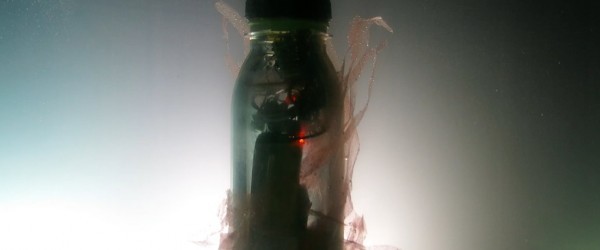Arts/Sciences #20: boredomresearch

Lecture: Bio-inspired Fragility and Technological Advancement
With two decades of artistic practice exploring an understanding of the natural world through the medium of computational technologies, boredomresearch have become intimately aware of the sensitivity and vulnerability of complex systems, including those which support human life on earth.
boredomresearch have been expanding their interest in bio-inspired systems in a project Robots in Distress which considers our strategies for coping in a world increasingly destabilised by human activity. In collaboration with the Artificial Life Lab (Karl Franzens University, Graz Austria), who are employing bio-inspired robots to provide solutions operating in human polluted environments, in 2016 boredomresearch started building robots made from the same plastic waste that pollutes many marine environments. Their work with biologists and engineers offers a different perspective which challenges a broader concern over a tendency towards increasingly complex solutions to answer the challenges of environmental crisis. This has led the artists to extend cutting edge research in artificial neural networks augmented by artificial hormone production to create autonomous agents with the potential for despondency. As emotional robotics becomes a reality does it also reveal a vulnerability? As we incorporate the robustness of swarm robotics into our technological armory should we also be mindful that the most archetypal swarm of all, the honey bee, is an organism in crisis. In this presentation boredomresearch foster a new vision for technological innovation, one that recognises the fragility of the environment that sustains it.
About boredomresearch
boredomresearch is a collaboration between British artists Vicky Isley and Paul Smith, their work benefits from a long lasting fascination in the mechanics of the biological world which they explore using contemporary technology. Their work transcends boundaries between art, science and society, with previous projects exploring topics including: the intricate biological signatures of neural activity, the frontiers of disease modeling and our cultural obsession with speed.
boredomresearch have been working in collaboration with world leading science institutions across Europe creating artworks developed from their ground breaking research. Their recent collaboration with Dr Paddy Brock, a mathematical modeler at the Institute of Biodiversity Animal Health and Comparative Medicine at the University of Glasgow led towards the creation of AfterGlow a new representation of a malaria infection transmission scenario which was awarded in September 2016 the Lumen Prize moving image award.

The art of boredomresearch opens channels for meaningful dialogue and engagement between public and scientific domains. For example, their work Real Snail Mail (the world’s first webmail service to use real snails) challenging our cultural obsession with speed, received worldwide attention, including: BBC, TIME Magazine, New Scientist and Discovery Channel Canada.
The artworks of boredomresearch are in collections around the world including the British Council and Borusan Contemporary Art Collection, Istanbul. Recent international exhibitions include: Balance Unbalance 2016, Manizales; Bio-Art 2015, Seoul; ISEA 2015, Vancouver; TRANSITIO MX_06 Electronic Arts & Video Festival, Mexico City in 2015; Soft Control: Art, Science and the Technological Unconscious, Slovenia in 2012 and Gateways, House of Electronic Arts, Basel in 2012.
Practical Info
Doors: 20:00
Lecture: 20:30
The presentation is in English
Free Entrance
Bar open!
Location: iMAL
30, Quai des Charbonnages
1080 Brussels
Streamed live on YouTube
Media Gallery <>
View on Youtube 
Arts/Sciences #20: boredomresearch. View on Flickr 
Arts/Sciences #20: boredomresearch. View on Flickr 
Arts/Sciences #20: boredomresearch. View on Flickr 
Arts/Sciences #20: boredomresearch. View on Flickr 
Arts/Sciences #20: boredomresearch. View on Flickr 
Arts/Sciences #20: boredomresearch. View on Flickr 
Arts/Sciences #20: boredomresearch. View on Flickr 
Arts/Sciences #20: boredomresearch. View on Flickr 
Arts/Sciences #20: boredomresearch. View on Flickr 
Arts/Sciences #20: boredomresearch. View on Flickr 
Arts/Sciences #20: boredomresearch. View on Flickr
Tags
activity
An archive : 1999-2010-2019
This page is an archive of the iMAL website that operated between 2010 and 2019. It compiles activities and projects made since 1999.
For our most recent news and activities, please check our new website at https://imal.org
